|

songs | interviews | photos | tours | boots | press releases | timeline
Recording Musicien (France)
March 2005
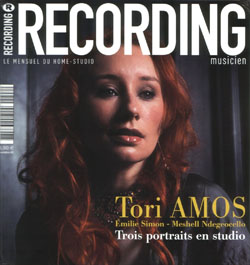
Tori Amos
<< Around Time >>
by J.-S. G.
[translation by Amandine]
Recording: Does having your own studio make you able to control both the artistic and technical sides of the songs?
Tori: Sometimes, the techs can forget the soul of the song but sometimes the artist can forget the technicals obligations. Mark is really into technical. With Marcel they both work very hard on the sound design, but sometimes I have to make them remember to not forget the structure. We only need a few persons around us to build places for the mind.
Recording: Did you find these places with Mark and Marcel?
Tori: Mark and Marcel have both been here with us since the Under The Pink Tour. They were and still are the "live guys". And they won't stop even if being on the road is wild -- your world changes every night, you can find yourself in places that suck... In the studio, everything is under control -- everything is done under our specifications.
Recording: What is your creating process?
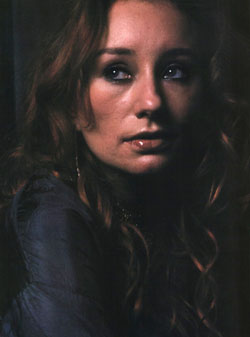 Tori: When I have a musical idea I put it on an old tape recorder. Mark and Marcel hopelessly want me to put on a digital one. It's like a catalogue, I record everything, day after day. And I examine it regularly. It's harder than just sit and play, especially when you are far from making something good with it. But if you're compelled to it, you can pick up from this catalogue and finally have sonic shapes, made of all these components that you can link between them. When I do this musical collecting I also see images, words that go along with it. Then the lyrics come, after the music, just like if they were alive. Then I play regularly the results to Mark and Marcel so that they can have an idea of the direction that I'm taking.
Tori: When I have a musical idea I put it on an old tape recorder. Mark and Marcel hopelessly want me to put on a digital one. It's like a catalogue, I record everything, day after day. And I examine it regularly. It's harder than just sit and play, especially when you are far from making something good with it. But if you're compelled to it, you can pick up from this catalogue and finally have sonic shapes, made of all these components that you can link between them. When I do this musical collecting I also see images, words that go along with it. Then the lyrics come, after the music, just like if they were alive. Then I play regularly the results to Mark and Marcel so that they can have an idea of the direction that I'm taking.
Recording: we want to know what arrives first, text or music, in a song like "Barons of Suburbia" with its specific structure?
Tori: On Barons it's the entity, text and music, that came first instinctively and then it's when we started working on the shape that the structure showed up. I like the idea of recursive patterns. It was very hard for Matt and Jon to make that song. The song was written, the structure was here and we had to find an arrangement because when you play odd scales, you can have your own perception of it. And there are so many things that happen between the moment when you play the song for yourself and the moment when everyone is here to put it on a record. That's why Mark and Marcel record everything in the case of the first take could be the good one.
Recording: Do you record the songs together with all the musicians?
Tori: Generally, Matt, Jon and I record together the first time. But Jon is not in my headphone. So that if he makes a mistake it doesn't disturb me. After all, he has like twenty-five songs to learn in a very short time. That's why he's in the control room with Mark and Marcel. Matt is in a specific room, close to the piano room, with his accoustic and electronic sets. That way everything is recorded separately. On some of the songs, I first made the base with the b3, and I needed to only hear those bases. When that was the case, we would only record Matt and me together. Generally the song is just a skeleton for Matt that he completes after. He has to be really fixed with me because I like cheating and turning around the time.
Recording: That's why your songs are really free with movement?
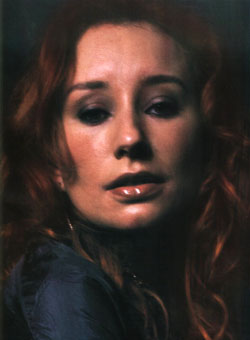 Tori: Every song has its own movement that you have to respect. Even if it doesn't fit the rules. For instance what is a sexy woman? Every one has its answer. It can be a big fat mama or someone that will never approach a gram of sugar. So there is this first phase. We don't care about finishing before the end of the day, it never happens anyway. It's better to make a little more every day. Then Mark and Marcel put together the piano and drums on Pro tools. Then Matt is going to build a groove and Jon is going to re-think everything. But this time they record together to know when they can push each other, as in General Joy. We played so many shows, there is a real osmosis between us. But first is what I play, my performance, and they play on what already exists. I don't think as a producer that the artist has to follow the time's conception of the bassist and the drummer. I'm sorry if I abuse my position but... in fact no! When my two creatures, Matt and Jon, have finished their parts, they leave. We found ourselves with great basic tracks, but you have to make a record with that and that's very complex. Because it would be nothing without the guitars and the harmonies.
Tori: Every song has its own movement that you have to respect. Even if it doesn't fit the rules. For instance what is a sexy woman? Every one has its answer. It can be a big fat mama or someone that will never approach a gram of sugar. So there is this first phase. We don't care about finishing before the end of the day, it never happens anyway. It's better to make a little more every day. Then Mark and Marcel put together the piano and drums on Pro tools. Then Matt is going to build a groove and Jon is going to re-think everything. But this time they record together to know when they can push each other, as in General Joy. We played so many shows, there is a real osmosis between us. But first is what I play, my performance, and they play on what already exists. I don't think as a producer that the artist has to follow the time's conception of the bassist and the drummer. I'm sorry if I abuse my position but... in fact no! When my two creatures, Matt and Jon, have finished their parts, they leave. We found ourselves with great basic tracks, but you have to make a record with that and that's very complex. Because it would be nothing without the guitars and the harmonies.
Recording: That's where Mac Aladdin shows up?
Tori: Yes... Mac is a kind of "recluse", all his life is based on his guitar. That's why his work is so good. The months after are devoted to guitars and voices. And it becomes really boring because the recording process is so long at the end whereas the basic tracks only took 3 weeks! But it doesn't matter. I always put a lot of money into the finalisation of my records. I should put some aside because times are getting hard but no. We have to take time to take your time. We were in the studio from May to mid December whereas the record should have been finished by the end of the year, in December I was still there to record!
Recording: Are you the one that directs the guitars sessions?
Tori: I listen to Mac's parts and then I ask the questions. Like in Sweet the Sting, in which the intro is really strong. We had to find a gimmick that would have worked well with the B3 on the verse. So we listened and listened to the song searching for this gimmick. When we found it, Mac played it or let's say he interpreted it, that's how he works.
At this stage I leave, because when I'm here Mac starts getting nervous. It's not that I'm arrogant or demanding. Mac is a musician really much more meticulous than me. But as a composer I have ideas of sounds. The work Mac does is really hard because he has to insert his guitar between the drum, the bass, the piano and the hammond. So we give him a lot of time to develop his ideas. For him all the space available is already taken. He needs a lot of patience and it's really frustrating, it's using.
Recording: After the piano, harpsichord, Rhodes, Wurlitzer... is the B3 the last accoustic instrument you had to affront?
Tori: It's not because you're a pianist that you can be able to play the organ. I don't play the pedals on the organ because my legs are too short. It's Mark that pushed me to play the hammond. For christmas he brought me an A100 and one day he told me "now you're ready to play the B3 !" i didn't want to. And I was affraid of the relation between the piano and the b3, of their complementarity. To me the piano is a girl whereas the organ is a male. But mark insisted, and I think he's the only person that was able to tell me that and that I was able to hear.
It's not like the record company would have told me : "oh you have to refresh your sound !" So I passed a long time playing the B3 and a new part of me has emerged from this playing.
Recording: You use the B3 in a really soft way without its screaming or biting side. Have you in a certain way made it feel more feminine?
Tori: Umm... maybe. The organ expresses itself through me, he's in my body, and in the conversation between the piano, it's like a wedding. It's like the symbolism on this cd, the bees tradition, their work, their union with flowers' organs, the way back to the hive and of course the pollination to make the garden okay. Everything changes because of this relation which is of course really sensual and sexual.
original article
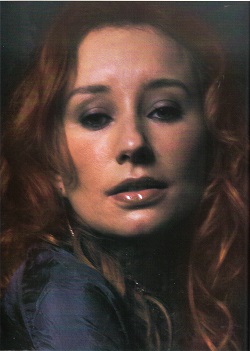 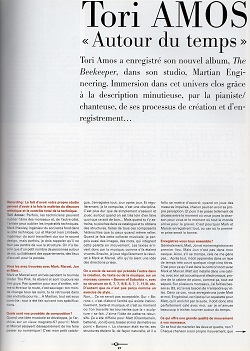
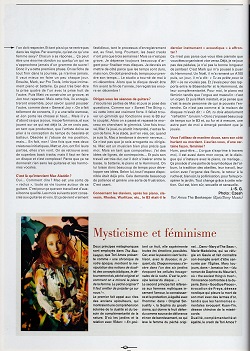 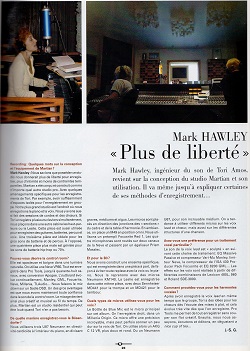
[scans by Sakre Heinze]
t o r i p h o r i a
tori amos digital archive
yessaid.com
|